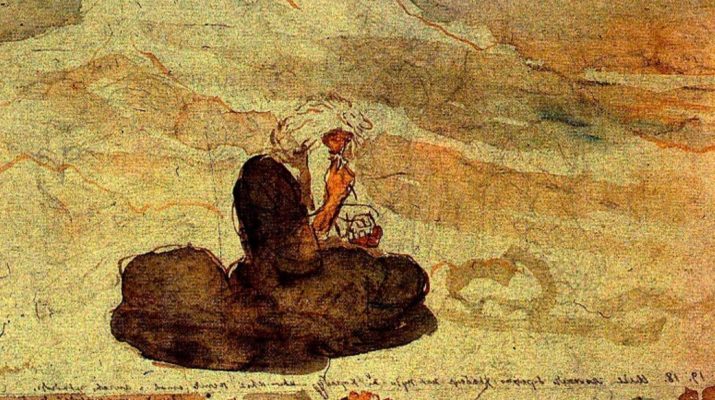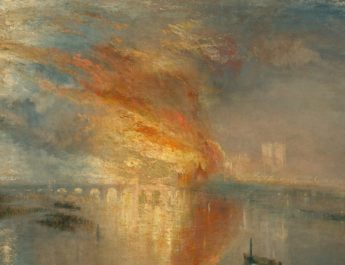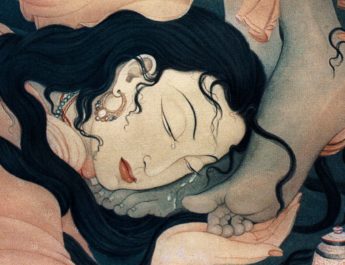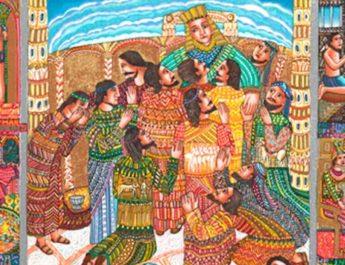1 Kings 19:4-8
Ordinary B37
4 But he himself wentA a day’sB journeyC into the wilderness,D
A “went” = halak. This is go, come, walk. It is walk literally and figuratively and includes people and animals. It can be used figuratively for one’s moral life – how we walk according to God’s way or against it. It can also refer to the walk of life as in the course one’s life takes, the choices we make, etc.
B “day’s” = yom. Root may mean being hot. This is the day in a literal or figurative sense. It can also mean birth, age, daylight, continually or other references to time.
C “journey” = derek. From darak (to tread, march, to walk. Can also mean affixing a string to a box since one needs to step on it to bend it in the process; so also an archer). This is a road as a thing that is walked on. Can be used figuratively for the path that one’s life takes or how one chooses to live one’s life.
D “wilderness” = midbar. From dabar (to speak, command, declare). This is mouth or speech. It can also be desert or wilderness. Additionally, it can be used for a pasture to which one drives cattle.
and cameE and sat downF under a solitaryG broom tree.H
E “came” = bo. This is to enter, come in, advance, fulfill, bring offerings, enter to worship, attack. It can also have a sexual connotation.
F “sat down” = yashab. This is to sit and so to remain and so to dwell. It is sitting for any reason – as a judge, in order to ambush, or just sitting quietly. Causatively, this can mean settling or marrying. This can also mean continue, endure, or establish.
G “solitary” = echad. Perhaps from achad (to unify, continue on a path; figuratively, to gather one’s thoughts). This is the number one, first, united. It can also be alone, altogether, a certain, a few.
H “broom tree” = rethem. 4x in OT. From ratham (to attach, yoke, bind). This is a broom plant or tree, or a juniper. It is perhaps retama raetam.
He askedI that heJ might die:K
I “asked” = shaal. This is to ask, inquire, beg, borrow, desire, request. It can also mean to demand.
J “he” = nephesh. Related to naphash (to refresh or be refreshed). This is soul, self, person, emotion. It is a breathing creature. Can also refer to appetites and desires.
K “die” = mut. This is to die in a literal or figurative sense. It can also refer to being a dead body.
“It is enough;L now, O Lord,M take awayN my life,O for I am no betterP than my ancestors.”Q
L “enough” = rab. From rabab (increasing in any aspect whether quantity, authority, size, quality, greatness, etc.). This is abundance, many, elder, exceedingly, great. It refers to abundance of amount, rank, or status.
M “Lord” = YHVH. From havah (to be, become) or hayah (to come to pass, become, be). This is the name of the God of Israel, the self-existent and eternal one, the tetragrammaton. This pronunciation has been lost to time so “Lord” is generally used in its place.
N “take away” = laqach. This is to take, accept, carry away, receive. It can also have the sense of take a wife or take in marriage.
O “life” = nephesh. Same as “he” in v4. See note J above.
P “better” = tob. From tob (to be pleasing, to be good). This is good, beautiful, pleasant, agreeable, bountiful, at ease. This word is used for goodness as a concept, a good thing, a good person. This can refer to prosperity and welfare as well as joy, kindness, sweetness, and graciousness. So, this is ethically good, but also enjoyably good.
Q “ancestors” = ab. This is father, chief, or ancestor. It is father in a literal or figurative sense.
5 Then he lay downR under theS broom tree and fell asleep.T
SuddenlyU an angelV touchedW him and said to him, “Get upX and eat.”Y
U “suddenly” = hinneh. From hen (lo! Behold! If, though; an expression of surprise). This is to draw attention, show suddenness or surprise, or to emphasize the importance of the coming statement. See! Lo! Behold!
V “angel” = malak. This is a messenger, an angel, or a deputy of some kind. Can be used for human messengers literally or for prophets, priests, or teachers as messengers of God. Also used for supernatural messengers i.e. angels.
W “touched” = naga. This is touch, reach, arrive, come near, strike. This is touching for any reason including sexual or violent.
X “get up” = qum. To arise, stand, accomplish, establish, abide. This is rising as in rising against, getting up after being sick or asleep, arising from one state to another, becoming powerful, or rising for action. It can also be standing in a figurative sense.
Y “eat” = akal. This is to eat, devour, burn up, or otherwise consume. It can be eating in a literal or figurative sense.
6 He looked,Z and thereAA at his headBB was a cakeCC baked on hot stones,DD
Z “looked” = nabat. This is to behold, look at intently, consider, or scan. It can mean to have respect or regard someone favorably.
AA “there” = hinneh. Same as “suddenly” in v5. See note U above.
BB “head” = meraashoth. 8x in OT. From rosh (head, captain, or chief; excellent or the forefront; first in position or in statue or in time). This is a place for one’s place so it could be a pillow, head rest, or other head piece.
CC “cake” = uggah. 7x in OT. Perhaps from ug (to gyrate, bake; baking a round cake). This is a bread cake that is round, cooked on the hearth.
DD “hot stones” = retseph. 1x in OT. Related to ritspah (coal, hot stone, pavement). This is a coal of a hot stone that one used in cooking.
and a jarEE of water.FF He ate and drank,GG and lay down again.HH
EE “jar” = tsappachath. 7x in OT. This is a jar or cruse.
FF “water” = mayim. This is water, waters, or waterway in a general sense. Figuratively, it can also mean juice, urine, or semen.
GG “drank” = shathah. This is to drink literally or figuratively. It could also be a drinker.
HH “again” = shub. To turn back, return, turn away – literally or figuratively. Doesn’t necessarily imply going back to where you started from. This is also the root verb for the Hebrew word for repentance “teshubah.”
7 The angel of the Lord cameII a secondJJ time, touched him, and said, “Get up and eat, otherwise the journey will be too muchKK for you.”
8 He got up, and ate and drank; then he went in the strengthLL of that foodMM fortyNN days and forty nightsOO to HorebPP the mount of God.QQ
LL “strength” = koach. Root may mean to be firm. This is power, strength, force. It can be literal or figurative, positive or negative. It can also mean capacity or means – what something produces. Additionally, it could refer to some kind of small reptile.
MM “food” = akilah. Related to “eat” in v5. 1x in OT. From akal (see note Y above). THis s a thing that is eaten such as food or a meal.
NN “forty” = arbaim. From the same as arba (four); from raba (to make square or be four-sided); perhaps from raba (to lie down flat; can be to lie for mating). This is forty.
OO “nights” = layil. Properly, this refers to light twisting away. It is used for night or midnight. Figuratively, this can mean adversity.
PP “Horeb” = Choreb. 17x in OT. From chareb (to devastate, desolate, or be waste). Horeb means waste or desolate.
QQ “God” = Elohim.
Image credit: “The Prophet Elijah in Desert” by Alexandr Ivanov, 19th century.




